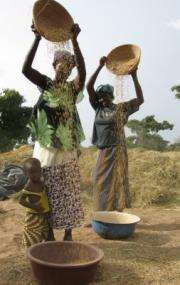Expect the unexpected when adapting to climate change in Africa, says researcher

(PhysOrg.com) -- Nations, communities and families in Africa need to safeguard their homes and livelihoods against the unpredictable effects of climate change, according to a discussion paper written by Imperial College London's Professor Sir Gordon Conway, published today (28 October).
The paper describes how predicting climate change's impact on specific countries, regions or towns in Africa is extremely difficult. Africa's climate is driven by three very complex factors - the cycle of hot air and rain in the tropics, the monsoons and the El-Niño/ La Niña phenomena in the Pacific ocean. This makes it hard to forecast what will happen, when and where.
Climate change could cause more frequent and severe floods, droughts and other extreme weather events; decreased access to drinking water; damage to agricultural land and crops; and the spread of diseases like malaria into previously unaffected areas - all of which could have serious consequences for the poorest members of society.
The uncertainty about where these effects will be felt in Africa presents a unique set of challenges, as Sir Gordon explains:
"Essentially it means having to prepare for the unknown," he said. "This might sound impossible but it's not - the key is helping people develop more resilient lifestyles and livelihoods, so that unknown and unpredictable 'shocks' and extreme weather events are not so damaging."
Sir Gordon is calling for governments, NGOs and the private sector to work together to increase communities' resilience to extreme weather events associated with climate change:
"For example, individual countries can build flood defences and set up weather insurance schemes. Communities can build cyclone shelters and introduce drought- and flood-resistant crops. Families can make sure they have more than one source of income - in rural areas this could involve women selling fruit and vegetables from home gardens, or weaving and selling handcrafts, to supplement the household income if agriculture fails," he said.
In addition, he says more research is needed to better understand the complexities of Africa's climate drivers.
"There is much that is known but also many unknowns," he concludes. "We need more scientific understanding and we need better, more detailed weather data from Africa."
Professor Sir Brian Hoskins, Director of the Grantham Institute for Climate Change at Imperial College London, adds:
"At present we are uncertain over the regional impacts of climate change, and we must gain more confidence in our predictions based on better understanding of how climate works. However it seems that Africa may be particularly badly hit: we urgently need to find ways of ensuring that communities can cope with the possible changes."
A full copy of the discussion paper, entitled: 'The science of climate change in Africa: impacts and adaptation' can be downloaded here.
Provided by Imperial College London (news : web)















